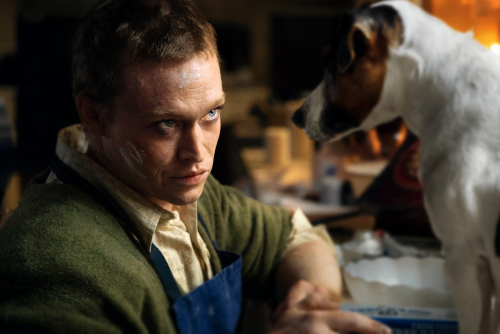
Shanna Besson/Apollo Films
MOVIE REVIEW
Dogman (2024)
Many an underdog ultimately has their day – often it's her day – in Luc Besson films, and in "Dogman" some actual canines ride the roller-coaster of abuse and transcendence that the director likes to think about. So too does their male human ally, Douglas (Caleb Landry Jones), whose childhood of relentless suffering culminates when his own Neanderthal father blasts him with a shotgun for the crime of caring about some helpless and photogenic puppies. Now largely confined to a wheelchair, an adult Douglas lives in a dilapidated old school with a pack of equally world-weary dogs, liberated from a pound. After what must have been some formidable training, which the film declines to show, he and the dogs happily cohabit in mutual respect and support. They fetch Douglas the correct ingredients from the kitchen for his cooking, and listen raptly while he reads Shakespeare to them. Retreating from society but still helping those who come to him with problems, Douglas sends his canine colleagues out on coordinated missions of justice, like Nick Fury dispatching the Avengers. The dogs evade capture and squeeze past obstacles and scamper between legs and through closing doors in order to locate exactly the right Latino gangster, and then clamp their jaws on his nuts.
The dogs are convincingly bedraggled and Mr. Landry Jones has an innate bruised intensity of his own, filmed by Mr. Besson from very close range at less than flattering angles. "Dogman" shapes up to be the least glamorous Luc Besson film to date, until Douglas finds his second tribe when he wanders into a drag club and has a revelation of personal freedom, courtesy of characters accurately credited as Drag Cher (Emeric Bernard-Jones) and Drag Madonna (Kyran Peet). Liberated by the freedom and theatricality of drag, and reaching the destination of a path that began with issues of Modern Woman read while an abused young man, Douglas is accepted without question as a kindred spirit by the performers. Eventually he belts out a full costume Edith Piaf karaoke onstage standing on his own unsteady legs, free at last for the duration of the song.
All of the drag queens and their culture and their roles as liberating angels are treated with discrete respect, while the yearning for a sympathetic hearing that Douglas broadcasts on a frequency even the dogs can hear is as basic and relatable as it gets. But if you were minded to think that Mr. Besson might himself be sending the same message after recent accusations of sexual misconduct, you also have to process that the film is sincere but not serious. The soundtrack zips through "Sweet Dreams (Are Made of This)" as Douglas goes on a fruitless job hunt, and "So What" when he decides to steal from the rich and redistribute some wealth instead. After scaring off the Latino thug at the request of a terrorized family, Douglas removes his wig and makeup while Nino Rota's love theme from "The Godfather" plays, as if Douglas had realized his heavy destiny at the head of this canine crime family. A dog delivers a severed finger to two New York cops and one of them does say "It looks like he's trying to tell us something," and that's really all you need to know about the film. Characters do the Luc Besson thing: They teeter over despair and find a way to go on living, birth families displaced by found families of greater value, battered but surviving. Cold nose warm heart, and the same goes for the dogs.
Comments